Serendip is an independent site partnering with faculty at multiple colleges and universities around the world. Happy exploring!
Notes Towards Day 11: What the Internet, and Globalization, Is Doing to Our Intellectual Lives

Summaries of our discussion by rmeyers and jrf
Jen's blogging about our class on her website
Pressure is being put on our conventional ideas of
intellectual property, by the global trafficking of information....
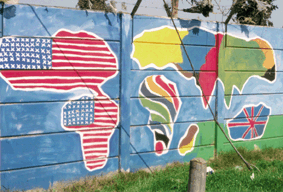 |
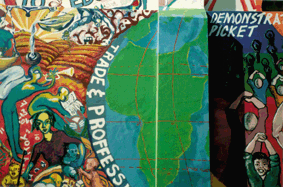 |
Murals of Maps, in the Cities of Africa...
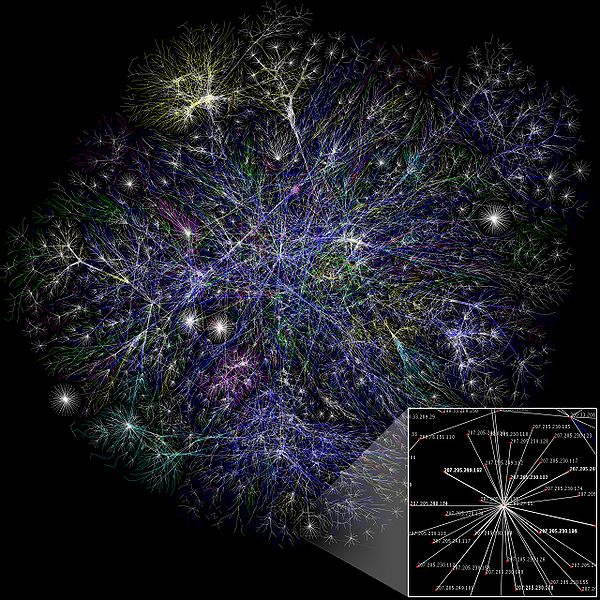
Map of the Internet, via Geeky Mom
I. Coursekeeping
rmeyers and skindeep as notetakers
Jen will also be blogging....
(remainder @ end of class: next week's fireworks!)
II. Today's Conversation with two senior thesis-writers,
come to give you a report on the current state
of the humanities: Jen Rajchel and Nicole Gervasio
...lots of great responses in our course forum, esp. to the Digital
Humanities Manifesto, but perhaps we might start w/ these questions:
Shayna: As for the English majors, I'd like to know how they feel about posting online when they are so close to applying for long-term jobs.
nk0825: I'm curious to see what our senior visitors during tomorrow's class have to say about their experience with the internet. Have either of them found that the Internet has helped them with their English major...
...and how do they feel about categorizing
themselves as an English major?
Jen to begin:
A Digital Humanities Manifesto
The Digital Humanities Manifesto 2.0
NINES: Nineteenth-Century Scholarship On-Line
Dickinson Electronic Archives
Stanford Humanities Laboratory: CROWDS
Moore and Media
The Institute for the Future of the Book
Kathleen Fitzpatrick's site, Planned Obsolescence:
Publishing, Technology and The Future of the Academy
Beyond the Dissertation Monograph
other responses from the course forum:
spleenfiend: I decided I believe new ideas are born very often, because ...each idea born of each combination is unique and nuanced. So chatter is necessary, no matter the cost. And I don't think anything in this post in definite.
jrf: If we aim to create a common pool of entirely free knowledge, would the only offense be the plagiarist's failure to contribute anything new to the discussion?
ShaynaS: Perhaps adding something to the manifesto along the lines of along the lines of "Plagiarism will be thought of ... as the failure to build upon ideas, a failure to help in the construction of this free-knowledge ideology." But then, what about copying and distributing things? Both of these are ways of adding to the chatter by amplifying a single idea through repetition.
sgb90: I have been re-thinking my thoughts on originality and its cultural connotations....as a cultural ideal, we still...emphasize the individual discovery of an idea while neglecting the influence of countless others in the emergence of that idea.
Reading the digital humanities manifesto, I was also struck to find that the word "copy" originally meant abundance, and that the authors suggest valuing "the copy more highly than the original." We have come to associate copies negatively: with dishonesty, unfair appropriation, and above all with an individual's lack in the ability to be creative/original. I don't think we need to lose a sense of personal worth in recognizing that none of us is particularly extraordinary or original in that most antiquated sense of the word, though I understand that the ego fights bitterly against the notion that nothing is truly one's one, in any totalizing sense.
nk0825: As I was reading the Digital Humanities Manifesto...I thought that some of the statements made were rather bold. For example, "The digital realm [is] open source, open resource...anything trying to close space is the enemy"....
I was amused by the idea of Wikipedia as a Wikiversity....a forum that engages the knowledge of thousands of people, all able to add in their thoughts/knowledge/experience.
Shayna: Can it be that teachers/professors/etc. do not trust Wikipedia as a reliable source because doing so would undermine the status of peer-reviewed journals (and the like) as the only legitimate ways of communicating elite, academic knowledge, and thus undermining the gatekeeper status of professors?
Herbie: I am against factually incorrect material.
III. Nicole to continue:
The English Institute 2009: Genre
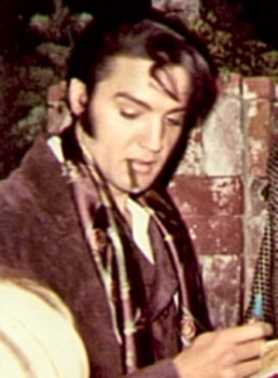 |
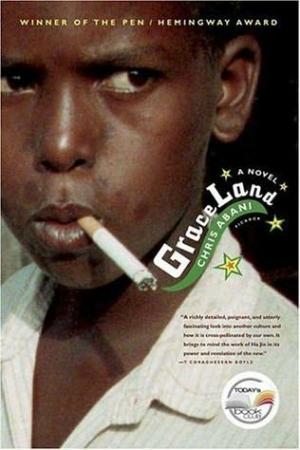 |

________________________
IV. Anne's (Resistant) Notes from The English Institute: Genre
"genre as oscillation, not category"
meditations on the genre of the academic talk
("undead": not viable but required)
and on the genre of introductions
(emphasis by "passing over";
cf. idiom of elegy, rhetoric of denial)
Jonathan Culler, "Why Lyric?"
on the device of present tense
(cf. Theory of Knowledge initiative to get rid
of "to be," because nothing "is," all is in flux?)
Wai Chee Dimock, Migration Across Genres
putting texts into new kinships-->
multilingual, multigeneric, multi directional:
stackable/switchable/scaleable
science fiction not bound by realism, w/ interest in large scale history
case reading re: reading practices: why we construct trajectories
Martin Puchner, Dramatism
"why do we use the same word to describe real and staged 'acting'?"
integrating drama and philosophy: reading Plato's Dialogues as plays
critique of biological language of descent,
replaced w/ friendship/elective affinity
make philosophy more anxious re: expression
respect limits of rationality in understanding human behavior
Deidre Lynch, Shandean Lifetime Reading Plan
Tristram Shandy as parody/faux novel:
time-consuming, repetitive, familiarizing
routine of reading, interrupting time
Alex Woloch, Partial Representation
how a text approaches its own generic limits, negotiates with structure
limbo: precarious state of representation,
vs. eternal fixed space of the Inferno
temporal instability, social precariousness of Brueghel;
vacillation between realist, allegorical frames:
ethical state of overlooking
problem of compositional multiplicity
Joseph Slaughter, Form and Informality
"theft of literary goods in the worldling of the novel":
proliferation of goods, and of meaning
parody as exemption to property law
intellectual property as constraints and catalysts in African novel
determinist (colonialist?) assumption of resemblance
as a relation of formal dependence
"greedy genre" of the novel, record of cultural knowledge
(travelogues read by pharmacutical researchers?)
state vs. street; formal vs. informal; producers vs. reproducers
Craig Dworkin, The Generosity of Kindness
can prose be a genre? a literary form, not a material format?
is printed in lines: geometric container, filling the page
(look @, not through it)
Roundtable on Genet's "Architext"
instability of genre categories: cultural, not formal, definitions
need transcultural theories
both literary forms and means of performance
question of participation in discourse: labeling can enable/inhibit
____________________________
V. coursekeeping to end
after-conversation w/ Tim Burke:
TPB1988: Help! I think I fell off the wagon!... after a lifetime of genres, opening up my mind is more difficult than I had hoped. Tim Burke’s blogs definitely helped expand my “boxed in” mindset but I still feel the genre monkey on my back. Does anyone have any suggestions as to how to suppress this habit?
[by writing your own papers on-line, &
really taking advantage of the platform?]
spleenfiend: I definitely prefer posting essays online to handing them in to only the professor for a number of reasons....I personally didn't feel constrained to a boring five-paragraph style...and I noticed I wasn't the only one who wrote in a less formulaic style...I like reading papers that "flow" and discuss a topic and make you think instead of just proving a thesis the writer may not even believe. Most traditional essays are boring to me. So, I may just have a short attention spans, but pictures, links, and clearer formatting in general are awesome, in my opinion.
Shayna: What kind of essay would be most appealing for me to read if I happened to stumble upon it? One that does not look like I'd be clicking back and forth between Dictionary.com, one that references examples with links so I can easily look it up without any googling on my part, and one that had a visual presence to facilitate my comprehension.
Molly: why not allow for more chatter by posting your paper online?
nk0825: I am curious as to why many of us chose to write less formally than we had in the past? ...Did anyone else find themselves questioning their reasons for writing this paper the way they did? I'm curious to see if anyone has different thoughts on this!
sbg90: while I was conscious of the changed medium I was writing for, this did not completely change my approach....I think it's important not to have images replace... the content of one's essay...not to detract from the writing itself (which, to me, remains most important).
OK! so: next week things get really interesting--> we'll
spend it deciding what we'll be doing for remainder of semester
As per the course homepage:
For the second 1/2 of the semester, the class will select together a second (and possibly third?) genre for our shared examination.
- Do you want to look @ something old? (Following Bakhtin’s claim that “faced with the problem of the novel, genre theory must submit to a radical restructuring,” it might be interesting to explore three hybrid novel forms written in the United States during the same decade as The Origin of the Species: Nathaniel Hawthorne’s “romance,” The Scarlet Letter [1850], Herman Melville’s “anatomy,” Moby-Dick [1851], and Harriet Beecher Stowe’s “sentimental novel,” Uncle Tom’s Cabin [1852]).
- Or will you want to look together @ something newer, such as
graphic novels,
feminist documentary films, or
video games?
- How about Fanfiction as Emerging Genre?
- Would you rather look @ current
electronic versions of old forms?
Dickinson Electronic Archives
The William Blake Archive
The Walt Whitman Archive
- Would you prefer to work through the writings of a single author, such as the South African J.M. Coetzee, about whom this advice was given in a NYTimes Review: "the prism through which to read...most of Coetzee’s work [is]...as a series of provocative genre-deformations...."?
- Or....?
BY 5 p.m. M, Mar. 1: post on-line in our course forum a proposal
for the remainder of the semester. If you were designing
a 6-week independent study for yourself, as a continuation of the work we have already done together, what would it look like?
What is the logic of your proposal? What is its theoretical frame?
What imaginative test cases would you choose to look @?
What might you expect to learn?
Make a pitch for the "generic(s)" you want to learn more about...
not forgetting advice, via Shayna: "before trying to improve your productivity, first ask yourself how many hours of work do you need to spend to be good at what you do?"
Summaries of our discussion by rmeyers and jrf
Jen's blogging about our class on her website


